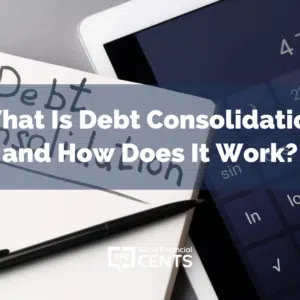Though we sometimes think of high debt as a self-inflicted wound, that’s often not the case.
Debt is a common problem in the aftermath of divorce.
And sometimes, it’s even the cause of the divorce!
So, how do you deal with post-divorce debt?
This topic was inspired by an Ask GFC question from Mike:
“Jeff, Thanks for checking in. When I have a moment I will check out your website more. I am interested in paying off debt and getting my finances in better order. I recently divorced and am now dealing with an excessive amount of debt. Any suggestions on how I deal with that? I’ll check out your site for help also. -Mike”
Table of Contents
I’ve never been divorced, but I do know a thing or two about debt, and whatever the cause, the solution is always basically the same. What complicates post-divorce debt is that it usually comes with a bunch of emotional attachments and special situations. For example, you’re stuck paying off debt that your ex-spouse helped create.
Some of it may be from the huge legal costs that come with divorce. And, of course, it’s a negative holdover from a failed relationship.
Those emotional attachments can get in the way, but that won’t help your cause. A good debt-payoff strategy will, however, and that’s what we’re going to focus on here.
The Variables That Come With Post-Divorce Debt
Mike doesn’t go into any detail in regard to his divorce, but there can be special financial considerations that complicate the debt payoff process. For example, child support and alimony are frequently involved, and in almost all cases, children are in the mix. This creates an additional financial burden, one that reduces cash flow and makes paying off debt especially difficult.
I bring this up – even though Mike doesn’t – because whether or not you pay these divorce-related settlements can have a serious impact on the timing of a debt payoff strategy. Of course, whether or not they matter at all depends on whether you are the custodial parent who is on the receiving end of the payments or the noncustodial parent who is actually making those payments.
Since the receipt of child support and alimony are not a concern for the receiving spouse, let’s focus on the impact on the spouse who makes those payments.
According to The Future of Children: A Collaboration of The Woodrow Wilson School of Public and International Affairs at Princeton University and The Brookings Institution, “The award amount for one child is 17% of the non-custodial parent’s gross income, 25% for two children, 29% for three children, 31% for four children, and 34% for five or more children”. That’s just one of several methods used to calculate child support, and it varies from state to state.
If large child-support payments are part of your divorce, and they are taking a significant amount of your income, it will naturally take you longer to get out of debt. The monthly outgo of child support and alimony competes directly with your ability to pay your debts. You may have to settle on paying off your debts over a longer period of time, such as 10 years versus five.
Under extreme circumstances, where child-support or alimony is particularly high, you may even have to put off your debt payoff plan until your children are emancipated, and you are no longer required to make child-support payments.
Be Sure to Continue Funding Your Retirement
This gets to a potential detour on the way to paying off debt. Divorce proceedings often include a Qualified Domestic Relations Order, commonly referred to as “QDRO,” in which retirement assets are split between the former spouses. This is very common when there is a big difference in the retirement assets of the two spouses.
For example, if one spouse has $200,000 in retirement assets and the other has $50,000, the court will very likely level the playing field. Since one spouse has $150,000 more in retirement assets than the other, the court may order that half of it – $75,000 – be transferred to the other spouse.
There are no tax consequences to this transfer of retirement assets, but it can deplete your retirement savings if you are the paying spouse. This may be another “debt” that you will need to repay – to yourself.
It may not be practical to attempt to make up the entire difference with additional contributions, but you should plan to continue funding your retirement while you’re trying to get out of debt.
It’s especially important to continue funding retirement because one day, your child support and alimony payments will end, and your debt will disappear. And when it does, you’ll need to have something waiting for you on the other end.
Though it may be tempting to eliminate retirement contributions and throw all of your extra money into debt, doing so could leave you unprepared for retirement. This is an especially important consideration if you will be fairly close to retirement age by the time your children are grown, and the time to prepare for retirement is short.
It’s a tough balancing act, but you should be intentional about continuing to fund your retirement while you pay off your debt.
Now, About Paying off Those Debts…
I know – it seemed like we would never get to this point! But paying off post-divorce debt is a much more complicated process. After you get done paying child support or alimony and funding your retirement, what’s left to pay off debt?
After all, you still have to live your own life, too, and that will bring a whole other batch of expenses with it.
This is why I suggested earlier that having a longer-term debt payoff horizon may be required. Unless you are a high-income earner and can live on a very small percentage of it, it will be a serious balancing act to cover all of your financial obligations. (Like, I have to tell you that if you’re already divorced!)
In this scenario, you can envision four separate financial obligations in order of importance, in which paying off debt is dead last:
1. Paying child support or alimony (if you don’t do this, you could end up in jail),
2. Funding your retirement plan (if you don’t do this, you could end up broke),
3. Paying for your own living expenses, and finally
4. Paying off debt
That may leave little for the debt payoff effort. This is why getting out of debt after a divorce really is a long-term process. But ultimately, time will be on your side. Here’s what I mean…
If you’re fresh out of divorce court, it may be all you can do to meet the minimum monthly payments on your debts. As time goes on and you are better able to manage cash flow, you can begin paying more than the minimum on each debt. You can also consider using a debt payoff strategy, such as the debt snowball, in which you pay off your smallest debt first, then move on to the next smallest debt until all debts are finally paid.
But you may also find that you are unable to get completely out of debt while you are paying child support or alimony. If that’s the case, the best strategy is to work at minimizing your debts until the support payments end, and then you can put all of your extra cash on the debts.
A good strategy at that point will be to make additional payments on your debts that are equivalent to what your child support or alimony payments were. That should enable you to get out of debt pretty quickly after the support payments end.
Notice I didn’t mention some of the usual debt “solutions,” like doing a debt consolidation or taking out a home equity line of credit? There are good reasons why I didn’t. Both are really a matter of moving debt from one pile to another without ever paying it off. Oftentimes, a house is lost in a divorce, so there is no security for the home equity line.
Getting out of debt is tough enough under ordinary circumstances. But trying to get out of debt after a divorce can be seriously complicated. Mike, my advice is to settle on a strategy and develop a large helping of patience. It won’t happen overnight, but it will happen – if you’re committed to the long term.
The Bottom Line – How to Deal With Post-Divorce Debt
Navigating post-divorce debt presents unique challenges intertwined with emotional residue from the past relationship and amplified by financial obligations such as child support or alimony.
While these debts might seem overwhelming, it’s essential to prioritize payments, bearing in mind the potential legal consequences of missing child support or alimony.
Furthermore, it’s imperative not to neglect one’s retirement savings, even when focusing on debt elimination.
Considering debt repayment might be a prolonged journey post-divorce, adopting effective strategies, such as the debt snowball method, can provide structured guidance.
Remember, patience, perseverance, and a clear roadmap can make the seemingly insurmountable task of debt clearance achievable.







